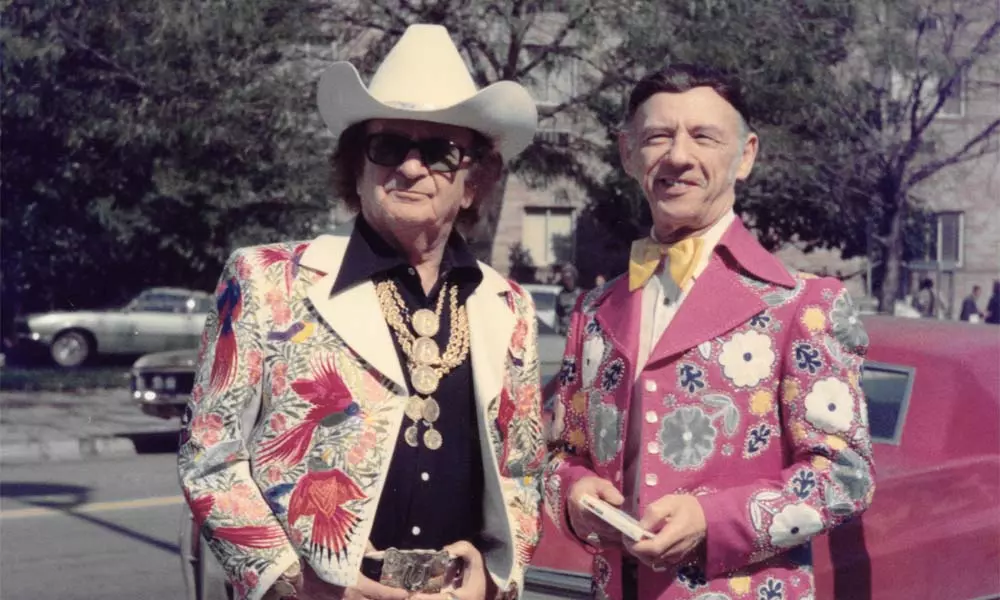For years, Western popular culture was defined by its steel-jawed men, dusty boots, and equally stark uniforms. But then came along a man named Nudie Cohn, an industrious Ukrainian immigrant and country music clothier who would usher in the age of star-spangled rodeo men and change Western wear and country music forever.
Even if you’ve never heard of the tailor to the stars, you’ve most likely laid your eyes on a Nudie suit. Characterized by their elaborately embroidered designs and meticulously placed rhinestones, they’re bedazzled Americana in its purest form.
“When he slid across the stage in that suit, that gold sparks were flying”
As a man who once graced the cover of Rolling Stone, Nudie Cohn was responsible for dressing the stars of country, rock, and Hollywood for more than four decades. His client list spanned from early country icons Hank Williams, Roy Rogers, Dolly Parton and Johnny Cash, to John Lennon, Elton John, Cher, Gram Parsons and, most famously, Elvis Presley’s $10,000 gold lamé suit that appeared on the cover of the greatest hit album 50,000,000 Elvis Fans Can’t Be Wrong.
“They said when he slid across the stage in that suit, that gold sparks were flying,” says Nudie’s granddaughter Jamie Nudie, who helped to run the historic family business Nudie’s Rodeo Tailors in North Hollywood, California.
Nudie Cohn brought a level of camp and showmanship to country music, fashion, and American pop culture that still resonates today – right up to modern country stars Midland, who favor the Nudie suit, telling uDiscover Music, “We’re artists… We’re not going to dress like accountants.” From the Grammys’ red carpet to the runway, Nudie’s presence still looms large as more try to emulate his masterful works of art.
“Every design that he ever did tells a story”
“They’re iconic designs,” says Jamie. “Every design that he ever did tells a story. And the story keeps being told.”
Nudie Cohn’s story is as quintessentially American as the cowboy westerns he idolized as a child. Like so many immigrants, his colorful moniker was borne out of a botched pronunciation at Ellis Island, turning Nuta Kotlyarenko into Nudie Cohn. Cohn was only 11 when he was sent by his parents, along with his brother Julius, from their native Kiev, Ukraine, to New York City. While his older brother was discovering girls, Nudie entertained himself watching Westerns in old theatres in the city.
His father was a bootmaker, so Nudie already had the sewing skills to scrape by. After a few itinerant years traveling around the country, he settled back in New York with his new wife Bobbie and they opened up their first business, stitching glitzy G-strings for vaudeville acts and burlesque performers under the appropriately-named banner Nudie’s For The Ladies. Eventually, he headed the siren call out West, and Nudie Cohn and his family set up shop in Hollywood and, later, the San Fernando Valley. Soon the “cowboys” he idolized became his clients, starting with Western swing musician Tex Williams, who also became Nudie’s benefactor, lending him $150 to buy a sewing machine to help start the business, thus establishing Nudie as the go-to tailor for elaborate country wear.
“If you’ve got the guts to wear it, and it’s a hit, you can pay me for it”
Shortly after, Hollywood came calling: first Gene Autry, followed by the “King Of The Cowboys” Roy Rogers, which saw Nudie’s designs appear on the small screen in Rogers and his wife Dale Evans’ hit TV program, The Roy Rogers Show. It was this fateful relationship with Rogers that would give rise to Nudie’s creative vision.
“Roy had said to him, ‘Listen I’ve heard about you around town and I want something for when I play at Madison Square Garden so that the kid in the nosebleed section can see me on stage,’” recounts Jamie.
“So my grandpa comes up with the idea of adding fringe to the shirt, and on every piece of fringe, he put rhinestones all the way down and that became the signature of Roy Rogers.”
Working with Rogers helped to raise Nudie’s profile, but it was his work with Lefty Frizzell that would cement his reputation in Hollywood and beyond. When the honky-tonk singer approached Nudie Cohn in 1957 to help him stand apart on a large bill, the tailor told him, “Lefty if you’ve got the guts to wear it, and it’s a hit, you can pay me for it.” He bedazzled both suit lapels with Frizzell’s initials in blue rhinestones and a trademark was born.
“You have no idea how great of a guy your grandfather was”
Nudie Suits were as colorful as the people who wore them. Each one was completely one of a kind and designed specifically to reflect the client’s image. A rose-covered suit and star-emblazoned hat for Elton John’s ‘Rocket Man’ cover art; wagon wheels for Porter Wagoner; and, of course, the famous poppies, pills, and pot leaves of Americana forefather Gram Parsons. All of The Flying Burrito Brothers had custom Nudie Suits and the tailor developed a special relationship with the singer-songwriter-guitarist.
“Gram looked up to Nudie as a father figure and Poppie saw Gram as the son he never had,” says Jamie. “These people: the actors, musicians, stars – they all became friends and family really. I’ve got pictures of Marty Robbins holding my daughter when she came home from the hospital. I went to Glen Campbell’s kids’ birthday parties. I grew up with these people.”
While some of Nudie’s famous clients such as Hank Williams might have been before her time, it was surreal to have her teenage crushes walk into the shop, as was the case with 70s teen idol David Cassidy. Years later, when Jamie attended a show of Cassidy’s in Vegas, the sitcom star came and sat on her lap during the performance and later told her backstage, “You have no idea how great of a guy your grandfather was.”
“It was more of a gathering place”
Part of this deep sense of affinity for the cowboy courtier sprung from the way Nudie Cohn ran his business. There are tales of forgiving outstanding debts, bailing guys out of jail, and helping people get back on their feet.
“Nudies wasn’t just a place to come in and get custom suits, but it was more of a gathering place,” remarks Jamie. “There was always a jam session going on all the time in the store. We did live remote radio shows and my job was to keep brewing up the coffee.
This latter job inspired Jamie to open up her own café, Nudie’s Custom Java, which doubled as a coffeehouse and a home to the countless photographs and memorabilia that used to hang in the store. During those long jam sessions, Nudie would also join in on his mandolin, and later even cut a record himself, titled Nudie And His Mandolin, released in 1974 and produced by Cliffie Stone, a country singer, and producer who’s famous for hosting the country TV show Hometown Jamboree. Half the time he gave the record away, says Jamie, but clearly music was a passion for Nudie all his life.
Just as the music evolved, Nudie adapted with it
“Country music has took over rock’n’roll,” Nudie told Rolling Stone back in 1969. “Doesn’t matter to me who buys clothes. Whatever does the best.”
Just as the music evolved, Nudie adapted with it, designing suits for rock icons suc as John Lennon, Sonny And Cher, ZZ Top, David Lee Roth, and the tailor even counted Sly Stone and Aretha Franklin as customers. As he got older, Nudie would cruise the Sunset Strip in his custom Nudie Mobiles and hit up The Roxy Theatre, The Whisky A Go Go, and The Rainbow Room, looking for new customers in need of something flashy.
If Nudie Suits were their own form of medieval tapestries, the Nudie Mobiles were pop culture icons in their own right. Outfitted in the same intricate chain stitching on the inside, with steer horns, silver dollars, and six-shooters on the outside, these cars became Nudie’s calling card as he drove around town. Most of them (like the suits) now live in far-flung locations: Buck Owens Crystal Palace in Bakersfield; The Valley Relics Museum in the San Fernando Valley; Bobbejaanland, a Western-themed amusement park founded by Belgian entertainer Bobbejaan Schoepen; and Nudie’s Honky Tonk in Nashville, which has been Jamie Nudie’s passion project as of late.
Along with Bill Miller, the man behind the recent Patsy Cline Museum and the Johnny Cash Museum in Nashville, Jamie Nudie lent some of her best Nudie Suits and one of her Nudie Mobiles to the new honky-tonk establishment. The three-floor, 12,000-square-foot watering hole also features three stages for live music, allowing visitors to Music City to experience all of Nudie’s flamboyant designs and the kind of music that inspired them.
As the family historian of sorts, Jamie helps maintain the Nudie Cohn legacy not behind a sewing table, but with undertakings like this.
“The reason why Poppie didn’t want me to learn how to sew was because he wanted me to learn about him and how the business worked,” says Cohn. “And I’m so grateful for that. I can’t sew a stitch, but I can tell you everything about him.”
This article was first published in 2018. It’s being republished today, in celebration of Nudie Cohn’s birthday. Listen to the best country songs on Spotify.



